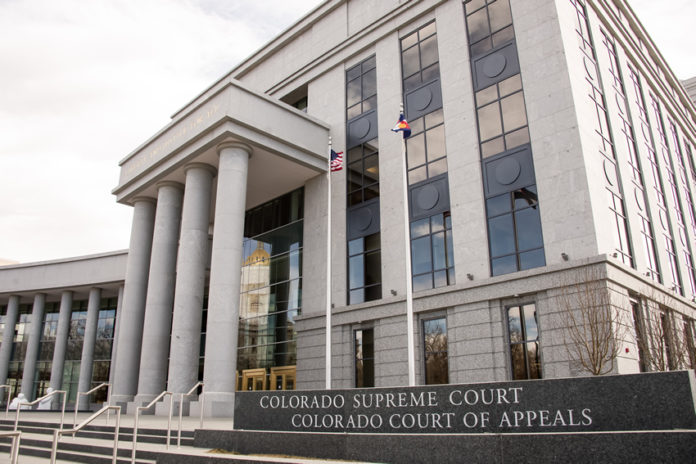
Editor’s Note: This article was updated at 2:40 p.m. on Friday to add information regarding selections for the investigaiton.
Colorado Supreme Court Chief Justice Brian Boatright, who has served as chief only since January, delivered his first State of the Judiciary address to the Colorado General Assembly on Thursday. Boatright spoke not only about the Judicial Department’s dedication to investigating recent allegations of inappropriate conduct and destruction of evidence but also addressing the many challenges facing the judiciary as the pandemic continues.
Boatright began his speech by directly addressing the allegations against the judicial branch and made clear it is his desire, the Supreme Court’s and the judicial branch’s desire to “get this right” by outlining the forthcoming investigation, a commitment to change and reinstating faith in the branch of government.
“We are committed to lifting the clouds over the branch and making it once again a rightful point of pride,” Boatright said before the legislature. “I look at all of you in the eye, and I commit to you — I promise to you — we will get this right.”
The current allegations leveled at the judicial branch include allegations of sexual misconduct, sexual discrimination, destruction of evidence, pay-offs, a judicial coverup, resignations of key personnel in disgust and a culture of inappropriate behavior among judicial branch staff, all brought to light by an investigation by the Denver Post into the 2018 dismissal of a staff member said to have been awarded a multi-million-dollar contract in order to keep quiet the former chief of staff for the State Court Administrator’s Office who threatened to expose the story if she was fired.
A two-page document from 2018, commonly referred to as the memo, was given to former Colorado chief court administrator Christopher Ryan by a member of the human resources department. The memo outlined a minimum of 20 alleged instances in which judges and other department officials committed misconduct. The Post reported that Masias would sue for sexual discrimination if she were fired, in part because she would lose her job and also because she was “passed over” for Ryan’s job.
Ryan resigned amid an earlier Post investigation in 2019 about the Masias contract, according to the Post. Masias’ contract was eventually cancelled, and Ryan never spoke directly with Masias about the memo.
The Supreme Court eventually turned the memo over to the Colorado Auditor Dianne Ray’s office and called for an investigation.
Boatright said that where there was wrongdoing, it would be addressed; where abuses of power took place, it would be stopped; and where policies were deficient, they would be changed.
“This will result in a culture change,” Boatright told the General Assembly, “and we are going to make sure that happens.” He added that there was recognition that there was a “crisis of confidence” faced by the branch and its leadership.
Regarding the memo, he said the document was a subject of conjecture. “I’m not here to comment on any of those claims of conjecture, except to say that the branch takes the allegations of misconduct by judges and staff extremely seriously.” First and foremost, he said, was the need for truth. For that reason, he requested an investigation on the circumstances of the contract and all incidents in the document.
Boatright said he had asked the governor, attorney general and legislative leaders to provide representatives for an independent panel to put together a proposal for defining the scope of the investigation, which will be done “by the book.”
On Friday afternoon, the Supreme Court, governor’s office and attorney general’s office jointly announced the team of investigators. The members are: Reps. Kerry Tipper and Adrienne Benavidez; Senator Bob Gardner; Jacki Melmed, chief legal counsel to Gov. Jared Polis; Kara Veitch, executive director of the Department of Personnel and Administration in the Executive Branch; Maritza Dominguez Braswell, the deputy attorney general overseeing the litigation and employment law section of the Department of Law; Senate Judiciary Committee Chair Pete Lee and House Judiciary Committee Vice-Chair Kerry Tipper. The panel will eventually form an independent council, and that person or firm will then conduct the investigation.
In this procedure, the judicial branch will not have any say in the selection process, Boatright said. The branch will cooperate with the investigation, and publicly release the results. Until the completion of the investigation, Boatright is to be made aware of any new allegations of misconduct and kept apprised of any investigation on a weekly basis.
Boatright said that the cornerstone of his personal judicial philosophy was in treating everyone with dignity and respect to the best of his ability. “That’s why I’m serious about getting answers here, because at heart, all of this is about how people are treated,” he said.
Following his speech, Senate President Leroy Garcia released a statement that if the recent allegations are true, “harassment, sexism, and power abuse are common occurrences throughout the ranks of the Judiciary — a truly horrifying thing to imagine.”
Unrelated to the allegations within the recently shared memo, Boatright said that approximately 18 months ago, the court realized there were significant issues within the department that required immediate action. Administrative responsibilities of the court were changed and new personnel for the court offices were brought in or searched for, he said. Traditionally, the chief had handled all administrative responsibilities, with updates to the rest of the court on actions.
There was a realization that all the justices needed to be much more involved with the branch, and now each justice oversees specific functions or aspects of the branch ranging from IT to HR, he said. The system was implemented not just to improve info flow, but also develop relationships with employees of the branch, he said.
Boatright said the judicial branch’s crisis isn’t limited to judicial misconduct but also in how much members of the community trust the criminal justice system to operate fairly, particularly among minority communities. Boatright said that efforts to diversify the bench have intensified, and he was proud to report that Gov. Jared Polis appointed more Black women to the bench between September 2019 and August 2020, a total of 25, than in the previous 25 years combined. Additionally, 59% of the judges appointed by Polis over the same period were female, Boatright said.
However, Boatright said that the racial justice protests over the past year remind everyone that much work remains to be done.
Boatright also addressed the tidal wave of cases currently backlogged due to the pandemic.Trial courts and probation officers have borne the brunt of the pandemic, he said. Despite risks to health, trial courts and probation officers have remained operating during the pandemic. While significant changes with tech have been implemented, hearings requiring in-person proceedings are growing.
For jury trials, often impossible during the pandemic, are facing an unprecedented backlog of trials, he said. Over the past five years, on average, 2,716 jury trials have taken place annually, of which 2,000 were criminal. However, in January, the total had reached 14,635 jury trials scheduled statewide, with over 10,000 of those being criminal trials.
“Our trial courts need help to provide access to criminal justice that our citizens need and deserve,” Boatright said. Without assistance from the General Assembly and ultimately the governor, the judiciary cannot handle the “tsunami” of jury trials awaiting.
He requested three things from the legislative branch: First, he asked for a revival of the senior judge program to allow retired judges to jump back into work to aid with the backlog of cases with flexible contracts and funding; second, he asked for additional staff and magistrates for trail courts and probation; and third, he asked for creation of flexibility around the six-month statutory deadline for jury trails.
Boatright said he would continue to let the chief judges of each district resume jury trials as they see fit.
But as he wound his way through his speech, Boatright made clear to the General Assembly why he described the many changes and adjustments underway.
“I bring these changes up not to claim that we’ve already changed the branch culture, but only to demonstrate that we are committed to the continued reflection on how we can improve,” he said. “It will take time, but we are committed to the cause.”




